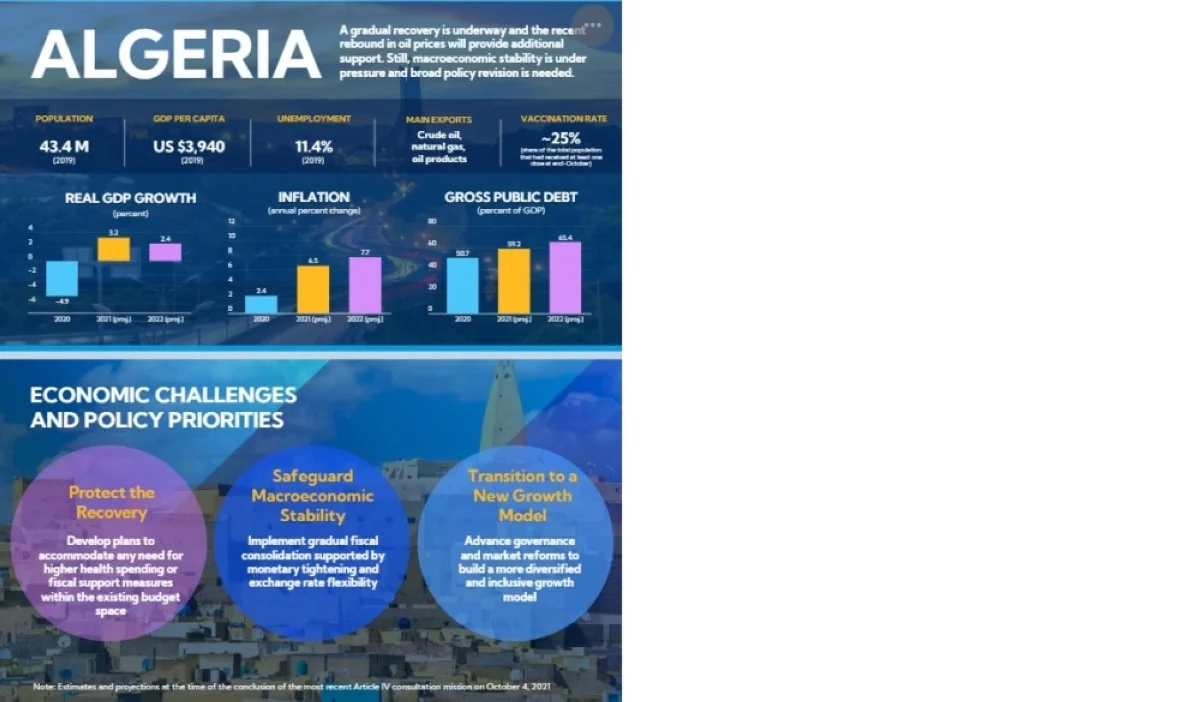WASHINGTON, DC: The Algerian economy was still emerging from the COVID pandemic when spillovers from Russia’s war in Ukraine and recurrent droughts pushed up inflation, while high international hydrocarbon prices boosted government revenue and exports, said the International Monetary Fund in a statement.
The Algerian economy is estimated to have grown by 4.2 percent in 2023, a robust performance owing to a rebound in hydrocarbon production and strong performance in the industry, construction, and service sectors, IMF Executive Board, said in the statement after concluding its Article IV Consultation with Algeria.
The external position remained solid with a current account surplus for the second year in a row. However, inflation pressures persisted (primarily due to high food prices) and monetary policy remained accommodative. The fiscal deficit is estimated to have widened, albeit less than foreseen in the 2023 revised budget because of relatively slow execution rates. The near-term outlook is broadly positive, but inflation remains a concern. Real growth is forecast to remain strong in 2024, at 3.8 percent, supported in part by large fiscal spending. Inflation would start to decelerate, particularly thanks to easing fresh food prices, although entrenchment at a relatively elevated level is a concern. The current account surplus is projected to narrow further in 2024 as hydrocarbon prices decline.
Medium-term economic prospects hinge on efforts to diversify the economy and the ability to attract private investment, and are subject to several risks. Risks on the downside include stubborn inflation, volatility in international hydrocarbon prices, fiscal risks from contingent liabilities, large budgetary financial needs, and rising public debt. Extreme climate events would affect the economy and the budget while a disorderly energy transition is a longer-term risk. On the upside, sustained, bold, and deep structural reforms and resolute efforts to diversify the economy, improve the business climate, attract investment, and tap new export markets could spur growth and job creation further, the statement further said.
The executive directors agreed with the thrust of the staff appraisal. They welcomed Algeria’s sustained solid growth and external position, despite multiple economic headwinds. While the near-term outlook is broadly positive, inflation remains high and downside risks, including from volatile commodity prices and climate hazards, require continued vigilance. In this context, the directors emphasized that a sound policy mix, accompanied by sustained implementation of reforms to diversify the economy and reduce climate related risks, will be necessary to ensure macroeconomic stability and promote inclusive and sustainable growth.
The directors welcomed the authorities’ commitment to medium-term fiscal sustainability. Noting the importance of maintaining social equity, they indicated that the large projected near-term fiscal deficit and financing needs could increase financial, fiscal, and inflationary vulnerabilities. In this vein, they encouraged the authorities to gradually rebalance fiscal policy to help preserve buffers and improve fiscal and debt sustainability, while ensuring targeted support for the most vulnerable.
They also noted that improving public financial management and establishing a rules-based medium-term fiscal framework would help support the authorities’ medium term fiscal plans.
The directors emphasized that proactive tightening of monetary policy, through raising the policy rate and reserve ratio, combined with continued liquidity absorption, will help support disinflationary efforts. Strengthening the monetary transmission mechanism and specifying price stability as the primary objective of monetary policy will also be critical. The directors welcomed the adoption of the Monetary and Banking Law aimed at modernizing financial markets and central bank operations and governance. They also underscored that greater exchange rate flexibility would enhance its role as shock absorber.
The directors welcomed the resilience of the banking system. They encouraged the authorities to reinforce bank supervision, monitor NPLs, and strengthen governance of state-owned banks and other SOEs. These will help reduce the systemic risks posed by the intertwined economic and financial links between the government, public enterprises and state-owned banks. Further improvements in financial inclusion will also be critical.











